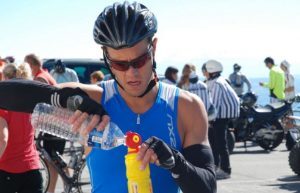
My bowl of rice with turkey breast and a handful of blueberries accompanies me.
2h30 minutes left for the test. I need energy for 80 minutes of high intensity effort. Today is a sprint triathlon. It is a special day.
I say goodbye to the competition in the same place where I did my first triathlon 21 years ago, in the Sports Association San Juan de Pamplona.
In all these years of dedication to sport, my way of feeding has also been trained. I have learned to know the foods that the body asks for, those that I feel better, those that are essential before or after competing or training hard.
I have experienced anemia in my case caused by an excessive destruction of red blood cells due to the impact of running. Also some other bird ...
I have discovered the need to make 5 or 6 daily intakes. The medium and long distance has taught me the importance of provisioning, as another thing to train.
Maintain the energy balance between eat-train-rest It is fundamental in the day to day of the athletes.
From my knowledge and experience, here are some tips:
Have breakfast as usual or even a little lighter two hours before at least. There is no need to change the habit or the food. Avoid milk and maybe cereals if they give you digestion problems.
My breakfast before competing included a tea with honey and 2 slices of bread with jam, maybe a ripe banana and some raisins and nuts.
If the competition is in the afternoon, you should eat slow-absorbing carbohydrates about 2h30'-3h before. I usually have a bowl of rice with chicken / turkey bits and blueberries or raisins; maybe a banana and some energy bar.
Up to 20 minutes before the exit drink water or soft isotonic drink that you know
The day before the race includes carbohydrates in lunch and dinner without neglecting the protein (light) and without inflation. Avoid salads and too much fruit because they can cause gas.
In the first minutes the body absorbs nutrients quickly, especially glucose. It is the key moment to recover the reserves of glycogen.
The absorption that occurs in the 15 minutes later has absolutely nothing to do with the one that takes place after half an hour and not much less after an hour, so we must look for high glycemic index foods.
It's time to drink sugary drinks, fruit, juices, cookies, some candy. If we also add a little protein we will get an optimal replacement of the reserves, for example liquid yogurt, milk, shakes.
About 2 hours we eat the first complete meal, which will include carbohydrates, fats and proteins. And maybe in a special way and as a whim and tribute to celebrate your triathlon. If the test has been of very long duration, hydrates become more important.
If you do not have too much appetite due to fatigue do not worry. Eat according to the body's request. Surely the next day and after the break will improve this feeling.
My body asks for tuna, chips, something salty and powerful, and not too much. I usually like liquid yogurt or kefir too; It comes very well to recover digestive wear in long tests especially.
It is usual to celebrate with children in the Mc Donalds and nothing happens ...
In the next article I will give you examples of timing, how to make the daily distribution between eating, training, living, working ... to get your best energy at all times.
Further information: http://www.actraining.es/ o www.anacasares.com
Photo: Ironman